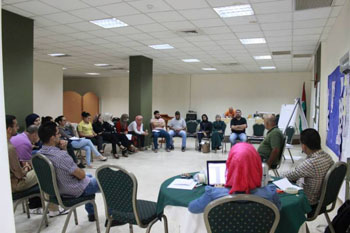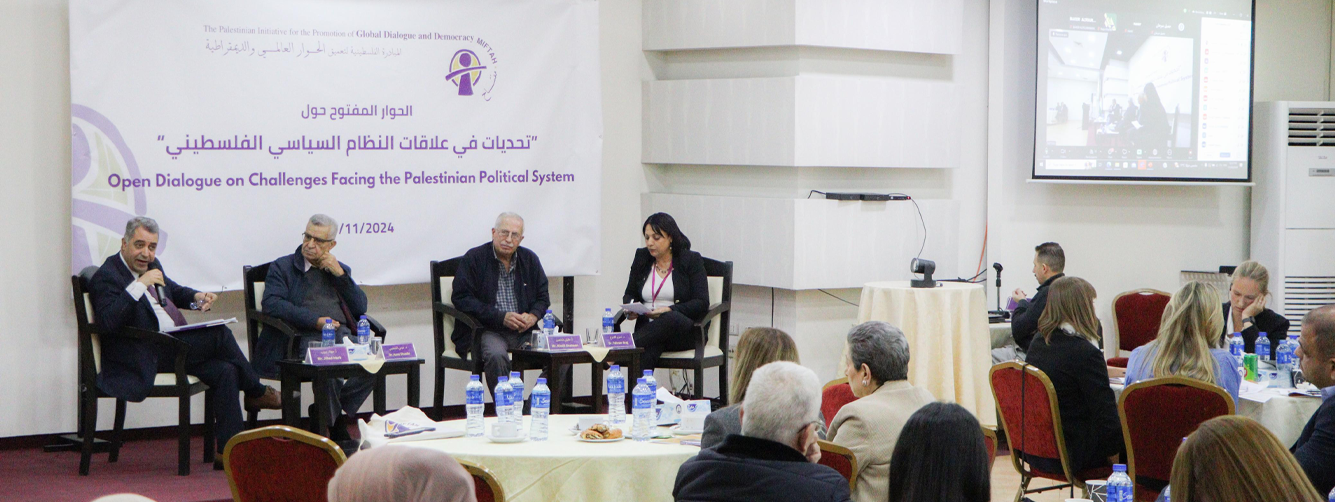
Ramallah – MIFTAH has always looked to spur on Palestinian youth in taking the initiative in the process of social change as part of its program for strengthening young Palestinian leaders. This program has been in operation since 2003 and has resulted in the formation of the Palestinian Political and Social Youth Network, comprised of Palestinian youths from various universities and communities throughout the West Bank. This year, the platform for the network was expanded to include a new group of active community leaders who underwent 11 days of intensive training on social transformation in conflict and strategic planning, according to the KUMI methodology.
The training was conducted over the course of four months, during which MIFTAH provided the target group with tools, ideas and skills necessary to become positively active and influential in their respective communities with the ultimate goal of merging them with the original network to implement community initiatives and activities.
Four youth leaders spoke of their experience: Hanin Allami from Beit Ummar, in the Hebron area; Raed Al Atrash from Hebron; Bayan Rjoub from Dura, Hebron; and Nicola Qawwas from Bethlehem. Here are their testimonies.
Hanin Allami: I underwent a real change
Hanin, a media student at Al Quds University, says the KUMI training had a tremendous impact on her. “Before the training, I felt as if I were a recipient; I would act without much thought. A real change has taken place in me and I feel I can think about things much deeper and not accept them as given facts without discussing and questioning them first.” Hanin also says she is more tolerant of others now after admittedly being somewhat rigid in her way of thinking, her beliefs and opinions. “Now I can calmly listen to others and accept them without it affecting my own beliefs,” she said.
Hanin went on that she even spread her newfound knowledge to her family by initiated discussions on basic issues in society such as religion. “There were changes in me that I never expected,” she admits, adding that she understands that social change does not happen overnight and that it takes patience and respect for others. “That is why I now understand the importance of partnership and accepting others for what they are without trying to change them.”
Raed Al Atrash: We broke away from indoctrination
Raed, a second year student of media administration in the Palestine Technical College in Arroub and president of the youth PLC, shared similar sentiments. “What is so distinctive about the 9-phase KUMI approach is the joint effort and work that goes into it, far removed from the method of indoctrination.” Raed admits that before the training, he was not very accepting of other people’s needs and finding middle ground with them. “After participating in the KUMI trainings, I am more accepting, more respectful of others and their needs,” he said, adding that he now has a stronger ability to analyze the conflict “whether from my perspective or from the perspective of others.” Raed also says he uses the knowledge from the training with his family and friends, accepting their needs without this impinging on his own needs and convictions.
This transformation was not easy for Raed, especially during the first few days of the workshops. He came with rigid political preconceptions and struggled internally after each training session. However, once he became involved in the training and broadened his mind, he was far more able to accept the needs of others and respect their ideas and convictions. Now he sings to a different tune: “I think this methodology should be used in all trainings for youth and women and in all sectors of society. We must build bridges of communication and understanding.”
Bayan Rjoub: A better understanding of Reality
Bayan, a student at Hebron University, says the most valuable thing she took away from the KUMI training was a better understanding of the reality around her, the resolution of conflicts and arriving at the truth. “I began to understand my needs and distinguish between goald and the people who I may clash with. This will make things easier for me in the future. The most important thing I learned was how to separate between the goal and the need so I do not forfeit my needs,” she said. She explained how in the past, anything that was different to her was deemed as hostile. “I always argued with my teachers over their teaching methods; they were oppressive and would hit the students,” she said. “Now I understand the problem between us and I can choose the more appropriate way to solve this problem.” Even at home, her family has become more accepting of Bayan in spite of the differences between them. “Still, I feel I can influence them towards change in spite of social norms.”
Nicola Qawwas: A qualitative Change
Nicola is extremely active in his own community – a Birzeit University student of mechatronics engineering, vice president of the youth PLC and a volunteer in more than one organization. He says the training added a number of things to his life that were not present before, including the ability to analyze conflicts and deal with them differently. “We went from working at the level of goals to the level of needs. In the past we used to approach our problems in the wrong way, but now we deal with the ‘other’ in another language. We help them reach the outcome in a way that they will understand.”
Nicola says the training paid off in his everyday life, in his community and even at the level of the youth PLC. “There are constant conflicts and bickering in the council, but after the training I can see a radical change. Now, I can understand the needs of others and not just their goals, hence, we can set our goals in a way that will meet our needs, even at the family level.”
Ruham Nimri: dealing with Cultural and Structural Depth Analysis
Ruham Nimri, one of the facilitators of the KUMI training explained that the methodology addresses the cultural and structural depth of societies in internal and external conflicts. Culturally, the methodology studies the culture of the given society through delving into the social norms that were prevalent during the time period that produced this particular culture. In addition, the methodology clarifies how to interpret this cultural depth through the structural depth – the laws and social structures that hold up and fortify the culture. Furthermore, he says the methodology lays down a group of new concepts, namely the concept of basic human needs, and works to meet those needs as a condition for the transformation of identity-based social conflicts. Here, the solution is at an entirely different level; it is not the solution of conflicts, but the social transformation of them, eventually arriving at the best solution that meets the needs of all conflicting parties.
It should be mentioned that the youth groups are preparing to carry out interactive activities in the coming stage, including debates with officials in an attempt to narrow the gap between Palestinian youth sectors everywhere. The activities are also aimed at building bridges of responsive communication to unify Palestinian youth concerns and build bonds of continuous participation and interaction with all social and political issues.
MIFTAH is also preparing for its third summer camp to be held during Sept – October 2014, for the Palestinian Youth Network during which youth groups will be brought together and a safe participatory space created, which is necessary for the network to operate as an influential body for youth in the Palestinian arena.







